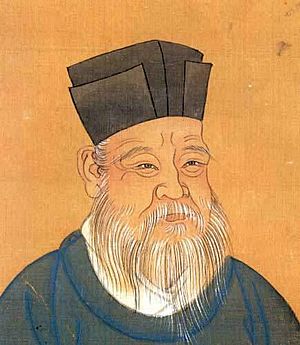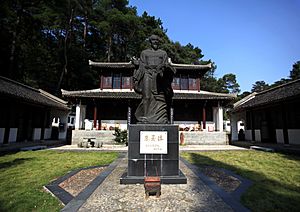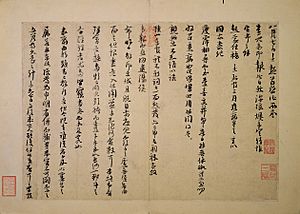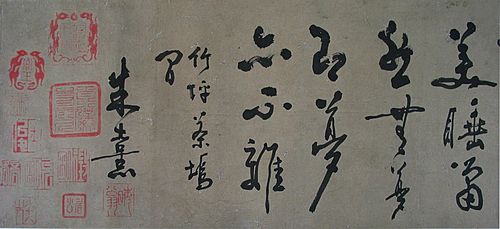Zhu Xi facts for kids
Quick facts for kids
Zhu Xi
|
|
|---|---|

Zhu Xi
|
|
| Born | October 18, 1130 Youxi, Fujian Province, Song dynasty
|
| Died | April 23, 1200 (aged 69) |
| Other names | Courtesy title: 元晦 Yuánhuì Alias (號): 晦庵 Huì Ān |
| Era | Medieval philosophy Song Dynasty |
| Region | Chinese philosophy |
| School | Confucianism, Neo-Confucianism |
|
Influenced
|
|
| Zhu Xi | |||||||||||||||||||||||||||||
|---|---|---|---|---|---|---|---|---|---|---|---|---|---|---|---|---|---|---|---|---|---|---|---|---|---|---|---|---|---|

Zhu's name in regular Chinese characters
|
|||||||||||||||||||||||||||||
| Chinese | 朱熹 | ||||||||||||||||||||||||||||
|
|||||||||||||||||||||||||||||
| Alternative Chinese name | |||||||||||||||||||||||||||||
| Chinese | 朱子 | ||||||||||||||||||||||||||||
| Literal meaning | "Master Zhu" | ||||||||||||||||||||||||||||
|
|||||||||||||||||||||||||||||
Zhu Xi ([ʈʂú ɕí]; Chinese: 朱熹; October 18, 1130 – April 23, 1200) was an important Chinese thinker. He was a calligrapher, historian, philosopher, poet, and politician during the Song Dynasty. Zhu Xi played a big role in developing Neo-Confucianism. This was a new way of thinking about ancient Chinese ideas.
He changed how people in China understood the world. His work included editing and writing comments on the Four Books. These books later became the main study material for government exams in China for hundreds of years. He also wrote about "investigating things" and developed meditation for self-improvement.
Zhu Xi was a very learned scholar. He studied many classic texts, histories, and writings. He served as a government official several times. However, he mostly preferred to teach and write. He wrote or edited almost a hundred books. He also wrote letters to many other scholars. He taught many students, some of whom studied with him for years. He built on the ideas of earlier thinkers. He developed theories about principle (lǐ) and vital force (qì). His students wrote down thousands of his conversations.
Contents
Life of Zhu Xi
Zhu Xi was born in Fujian province. His family came from Wuyuan County. His father was a local sheriff. In 1140, his father lost his job. This was because he disagreed with the government's policy towards the Jurchen people. After this, Zhu Xi was taught at home by his father.
People say he was a very smart child. At age five, he asked what was beyond Heaven. By eight, he understood the meaning of the Classic of Filiality. When he was young, he was inspired by Mencius. Mencius believed that all people could become wise leaders. After his father died in 1143, Zhu Xi studied with his father's friends.
In 1148, at 19, Zhu Xi passed the Imperial Examination. This meant he became a "presented scholar." His first official job was in Tong'an from 1153 to 1156. In 1153, he began studying with Li Tong. Li Tong followed the Neo-Confucian ideas of Cheng Hao and Cheng Yi. Zhu Xi officially became Li Tong's student in 1160.
In 1179, Zhu Xi was appointed Prefect of Nankang. He had not held an official job since 1156. While there, he helped reopen the White Deer Grotto Academy. Three years later, he was removed from his position. This happened because he spoke out against some powerful officials. He was appointed and then removed from office several times. After his last appointment, he faced many accusations. Some people even wanted him to be executed. Much of this opposition came from Han Tuozhou, a powerful prime minister.
Even though many important people disagreed with his ideas, nearly a thousand people attended his funeral. After Han Tuozhou died, Zhu Xi's ideas became very important. His followers, Zhen Dexiu and Wei Liaoweng, made his type of Neo-Confucianism the main philosophy in the Song court.
In 1208, eight years after he died, Emperor Ningzong of Song officially recognized Zhu Xi's importance. He was given the special name Wen Gong, meaning "Venerable gentleman of culture." Around 1228, Emperor Lizong of Song gave him the noble title Duke of Hui. In 1241, a special tablet for Zhu Xi was placed in the Confucian Temple in Qufu. This meant he was seen as a very important Confucian sage. Today, Zhu Xi is honored as one of the "Twelve Philosophers" of Confucianism. Many Chinese people still call him Zhu Wen Gong.
Zhu Xi's Teachings
The Four Books
During the Song Dynasty, Zhu Xi's ideas were seen as new and different. Other Neo-Confucians focused on the I Ching. But Zhu Xi chose to focus on the Four Books. These were the Great Learning, the Doctrine of the Mean, the Analects of Confucius, and the Mencius. He believed these books were the most important for students who wanted to become government officials.
He wrote long explanations for all these classic books. At first, his explanations were not widely accepted. But later, they became the official way to understand these texts. The Four Books, with Zhu Xi's comments, were the basis for government exams until 1905. Studying these classics often started with Zhu Xi's explanations.
Vital Force, Principle, and the Supreme Ultimate
Zhu Xi believed that everything in the world is made from two main things. These are qi (气), which is like a vital or physical force, and li (理), which is like a rational principle or law. The source of all li is the Taiji (太极). This means the Supreme Ultimate.
According to Zhu Xi, every object and every person has its own li. This means everything is connected to the Taiji. What we call the human soul or mind is seen as the Taiji working within a person.
Qi and li always work together. They depend on each other in all living things. These two parts show up when new things are created. When they are active and expanding, it's the yang energy. When they are slowing down and contracting, it's the yin energy. Yang and yin constantly interact, gaining and losing power over each other. This process creates the five elements: fire, water, wood, metal, and earth. Zhu Xi believed that li existed even before the world was created.
Zhu Xi's ideas about li and qi are similar to some Buddhist ideas. However, Zhu Xi and his followers strongly said they were not copying Buddhist ideas. They believed their concepts came from the ancient Chinese I Ching.
Zhu Xi also thought his Taiji concept fit with the Taoist idea of Tao. But his Taiji was different from the Taoist Tao. Taiji is a principle that creates new things. The Taoist Tao is still and quiet. It makes all things equal. Zhu Xi argued that there is a central harmony that is not still or empty. He believed the Supreme Ultimate is always creating new things.
Human Nature
Zhu Xi thought that the earlier Confucian thinker Xun Zi was wrong. Xun Zi disagreed with Mencius' idea that humans are born good. Zhu Xi believed that even if people act badly, the main principle of the universe is good. Bad actions happen because of qi.
Zhu Xi's philosophy says that everything has li and qi. Li is the principle that is in everything and controls the universe. Each person has a perfect li. So, people should act in a perfectly moral way. But qi is also part of everything. Qi can hide our perfect moral nature. The goal of moral training is to clear our qi. If our qi is clear and balanced, we will act morally.
Heart and Mind
Having a clear mind and a pure heart is a key idea in Confucian philosophy. In his poem "Reflections While Reading - 1," Zhu Xi explains this. He compares the mind to a mirror. This mirror is covered until it's needed. Then it simply reflects the world. It stays clear because of flowing water, which represents the Tao. In Chinese, the mind was sometimes called "the square inch." This is what the poem refers to at the beginning.
|
半畝方塘一鑑開, |
A small square pond an uncovered mirror |
| —translation by Red Pine |
Knowledge and Action
Zhu Xi believed that knowledge and action cannot be separated. They are both needed for truly smart activity. He said that knowing comes first because you need to think before you act. But action is more important because it makes something happen. Zhu Xi said, "Knowledge and action always need each other. It's like a person who can't walk without legs, even if they have eyes. And they can't see without eyes, even if they have legs. So, knowledge comes first, but action is more important."
Investigating Things and Expanding Knowledge
Zhu Xi encouraged people to 格物致知 (gewu zhizhi), which means "investigating things." What these "things" are and how to investigate them was a big topic of discussion. For Zhu Xi, "things" were moral principles. Investigating them meant paying attention to everything in books and in daily life. He believed that "moral principles are quite endless."
Religion
Zhu Xi believed in spirits, ghosts, fortune-telling, and blessings.
Meditation
Zhu Xi practiced a type of daily meditation called jingzuo. This was similar to, but not the same as, Buddhist meditation. His meditation did not require stopping all thoughts. Instead, it was about quiet thinking. This helped balance different parts of a person's mind. It also allowed for focused thought and concentration.
His meditation was Confucian because it focused on morality. He tried to think and feel in harmony with the universe. He believed this type of meditation brought people closer together and into greater harmony.
Teaching and Learning
Zhu Xi spent a lot of his time teaching. He believed that learning was the only way to become a wise person. He wanted everyone to be able to try and become a sage.
He was concerned about new printing methods. He thought that having too many books made students less focused. So, he tried to change how students should learn and read. He was not happy with the local schools in China. So, he started his own school, the White Deer Grotto Academy. He wanted to teach students in the right way there.
Taoist and Buddhist Influence on Zhu Xi
Zhu Xi wrote the accepted Confucian explanations for many ideas from Taoism and Buddhism. He seemed to use some ideas from these other ways of thinking. However, unlike earlier Neo-Confucians, he strictly followed Confucian ideas about actively working to improve one's morals. He felt that Buddhist ideas could confuse the mind and harm human relationships.
Zhu Xi's Legacy
From 1313 to 1905, Zhu Xi's explanations of the Four Books were the main study material for government exams in China. His ideas were very important for later Neo-Confucians like Wang Fuzhi. However, some thinkers like Wang Yangming later disagreed with some of his ideas.
His philosophy remained important even after the Intellectual Revolution of 1917. Later, a scholar named Feng Youlan used Zhu Xi's ideas about li, qi, and taiji to create a new philosophy.
Zhu Xi was also very important in Japan, where his ideas were called Shushigaku. In Korea, his ideas were called Jujahak, and they became the main way of thinking.
Life magazine once ranked Zhu Xi as the forty-fifth most important person in the last thousand years.
Zhu Xi's family members, like those of Confucius, held a special inherited title. They were called Wujing Boshi, which means "Doctor of the Five Classics." They had a high rank in the government system.
Calligraphy
From a young age, Zhu Xi followed his father and other great calligraphers. He practiced calligraphy a lot. At first, he learned the style of Cao Cao. Later, he focused on the regular script of Zhong Yao and the running cursive script of Yan Zhenqing. Most of his calligraphy works are lost, and what remains is often incomplete. His fame as a philosopher was so great that his amazing calligraphy was often overlooked.
He was skilled in both running and cursive scripts, especially with large characters. However, most of his surviving works are short notes in running script. His real manuscripts are kept in museums like the Nanjing Museum and the Beijing Palace Museum. Some are in private collections. The Thatched Hut Hand Scroll, one of Zhu Xi's best works in running-cursive script, is in a private collection overseas.
The Thatched Hut Hand Scroll has three parts:
- The title.
- 102 characters written by Zhu Xi in running cursive scripts.
- Notes added later by famous people like Wen Tianxiang, Fang Xiaoru, Zhu Yunming, Tang Yin, and Hai Rui from the Ming dynasty.
Calligraphy Style
Zhu Xi's calligraphy was praised for looking like the style from the Han and Wei dynasties. He used the center of his brush well. His brush strokes were smooth and round, steady yet flowing. They showed no signs of being silly or sudden. His calligraphy has a stable and elegant structure. It also has a continuous flow of energy.
His written characters look balanced, natural, and unique. He was a leader in Confucian philosophy. So, his deep learning showed in all his writings. He respected traditional rules. He believed that rules should be followed for each word. But there should also be room for flexibility and naturalness. This means calligraphy should follow rules but not be trapped by them. This allows for a natural quality. It is no surprise that his calligraphy has been highly respected for centuries by many important people.
See also
 In Spanish: Zhu Xi para niños
In Spanish: Zhu Xi para niños
- Confucianism
- Neo-Confucianism
- Zhou Dunyi
- Lu Jiuyuan
- Wang Yangming
- Wang Fuzhi
- Feng Youlan
- Yuelu Academy
- White Deer Grotto Academy
- Classical Chinese writers
- Yi Hwang or Toegye, A Korean Confucian scholar of the Joseon Dynasty
- Yi I or Yulgok, A Korean Confucian scholar of the Joseon Dynasty
- Fujiwara Seika, Japanese follower of the philosophy of Zhu Xi
- Hayashi Razan, Seika's student & Tokugawa political theorist
- Hayashi Gahō, Tokugawa shogunate academician/scholar/bureaucrat
- Kaibara Ekken, Edo period writer/botanist/philosopher
 | Anna J. Cooper |
 | Mary McLeod Bethune |
 | Lillie Mae Bradford |





